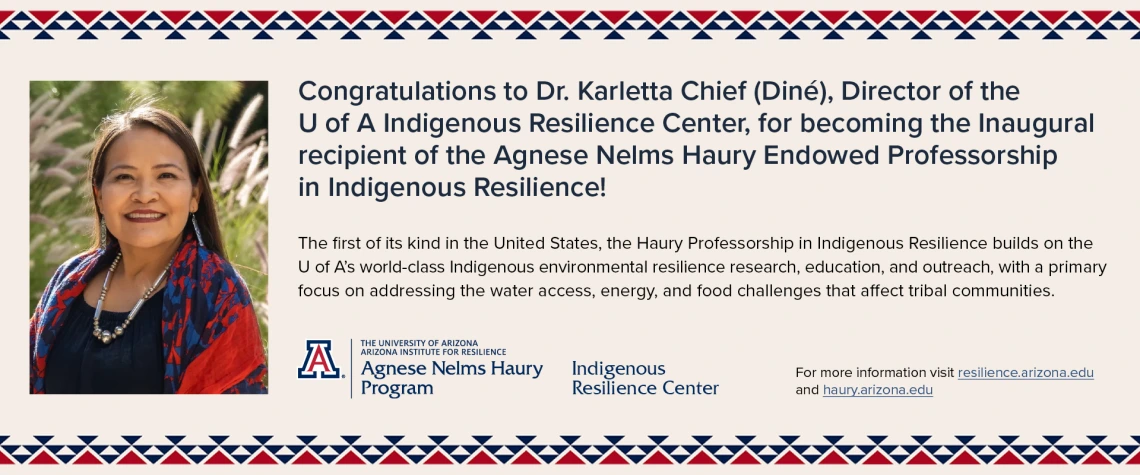Agnese Nelms Haury Endowment Professorship in Indigenous Resilience

The first of its kind in the United States, the Haury Professorship in Indigenous Resilience aims to further build on University of Arizona’s world-class Indigenous environmental resilience research, education, and outreach, with a primary focus on addressing the water access, energy, and food challenges that affect tribal communities.
This Endowed Professorship also promotes the Agnese Nelms Haury Program’s commitment to fortifying the University of Arizona’s capacity to recruit and retain globally respected experts in Indigenous environmental resilience, and to co-create climate adaptation solutions that lead with respectful tribal engagement and that blend education and research with Indigenous cultural values.
In the Fall of 2025, Dr. Karletta Chief, a renowned Diné hydrologist and director of the University of Arizona Indigenous Resilience Center, is the inaugural recipient of the Agnese Nelms Haury Endowed Professorship in Indigenous Resilience. Chief was chosen for the Endowed Professorship in recognition of her extraordinary contributions to the fields of hydrology, Indigenous resilience, environmental justice, and climate change outreach and research, and for her nationally recognized ability to forge trust-based relationships with tribal leaders and experts, designing and implementing applied research solutions and student training programs that honor tribal sovereignty and that respect Indigenous resilience knowledge.
“Thank you to the Haury Program for the Professorship in Indigenous Resilience,” said Chief. “It is an honor to be the first recipient of this award. Having the Professorship live within the Indigenous Resilience Center will allow us to support experts who are working with Tribes based on the values of relationship, respect, reciprocity, and responsibility.”
“Aboriginal scholar Marion Kickett in 2011 defined Indigenous resilience as “The ability to have a connection and belonging to one's land, family and culture, therefore an identity. Allowing pain and suffering caused from adversities to heal. Having a dreaming, where the past is brought to the present and the present and the past are taken into the future. The ability not just to survive but to thrive in today's dominant culture. This definition really resonates with me and to me, Indigenous Resilience is the braiding of traditional knowledges with scientific knowledge to co-design innovative environmental solutions while honoring culture, language and traditions.”
“I don’t do this work alone. Community driven environmental research with Native Nations occurs as a team effort with my community partners, faculty, staff and students who work alongside me. My commitment to communities comes through my passion to give back to Indigenous communities and Diné communities. I represent my family and ancestors through my four clans as Bitterwater, Near-the-water, Manygoats, and Red-running-into-the-water Clans and it is upon their shoulders and the Creator’s blessings to be able to be in this place do the work I am doing but also remembering the challenges that Indigenous communities and peoples have come through and face today. I am incredible grateful and humbled to receive this tremendous honor by the University of Arizona Haury Program. With this endowed professorship, I will be working collaboratively with tribal partners to develop a Food-Energy-Water Indigenous resilience framework using place-based, data-driven resilience indicators to enable the tribes to better respond to pandemics/disasters.”
As the founding director of IRes, Chief built transformative partnerships with Tribal Nations, secured major research grants, and mentored the next generation of Indigenous scientists and leaders. IRes was founded in 2021 with a vision of thriving Native American communities leading sustainable environmental solutions. As a research center, IRes centers Indigenous Ways of Knowing into co-designed environmental community solutions. Leading a team of faculty, staff, and community members, the Center has raised over $28M to ethically address the challenges that Tribal communities face, building trust and transparency in the process.
“Quite often we see these endowed professorships in other regions of the world, especially within Canada. We are very thankful of the Agnese Nelms Haury Program for breaking down barriers and allowing Dr. Chief to hold this new professorship,” said IRes assistant director Daniel Sestiaga Jr. “We have been truly blessed to have a supporter like the Haury Program and its team, who are invested in the Center’s success, vision, mission, and the overall dedication to ensuring that tribes have access to area expertise that is so relevant to today’s environmental and societal challenges.”
“This is a beautiful inflection point for the Haury Program, as we build upon our first ten years and set our sights on addressing the environmental resilience challenges before us,” observed Haury Program executive director and U of A Regents’ Professor and Professor of Law Milton O. Riepe Chair in Constitutional Law Emerita and Dean Emerita Toni Massaro. “We are delighted that this Endowed Professorship is now a reality, and that Dr. Chief will be its inaugural holder. Our university’s ability to achieve its highest goals for the communities we serve depends upon our ability to recognize and support faculty leaders of Dr. Chief’s caliber.
“We know Mrs. Haury likewise would have been happy to see this honor conferred on Dr. Chief and to advance her work and that of the Indigenous Resilience Center. Our Donor Advisory Board also deserves our gratitude and recognition for their support of this professorship, and for their unfailing dedication to the greater good through philanthropy, their faith in our university and faculty, and their compassionate care for our planet. Together, we can make the world a better place for all people.”
Please see the full press release by University of Arizona News here.
